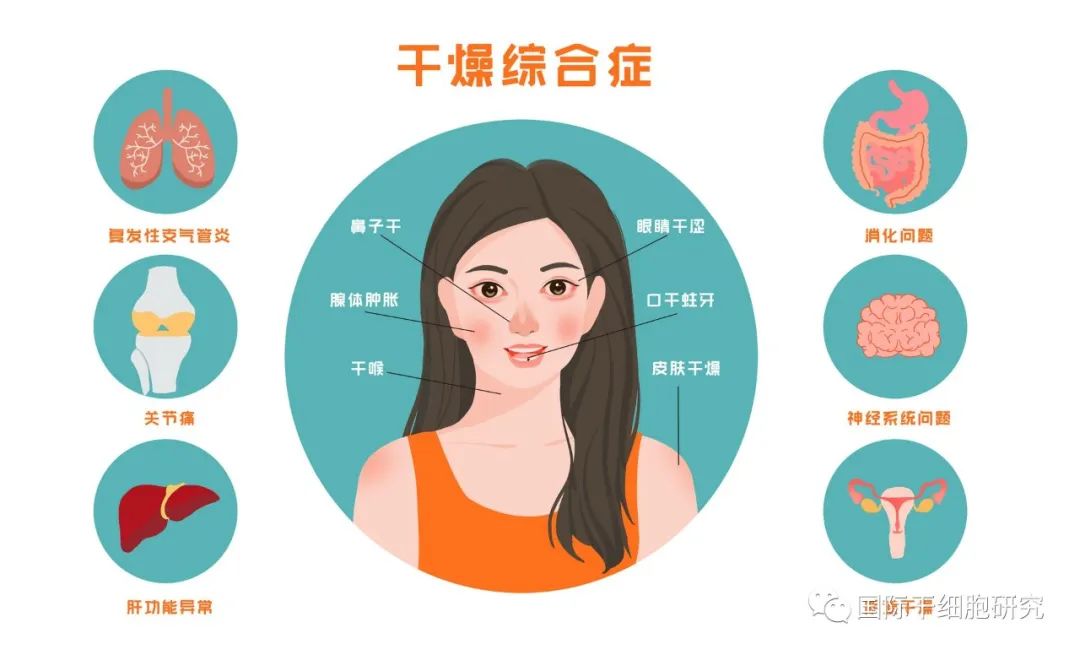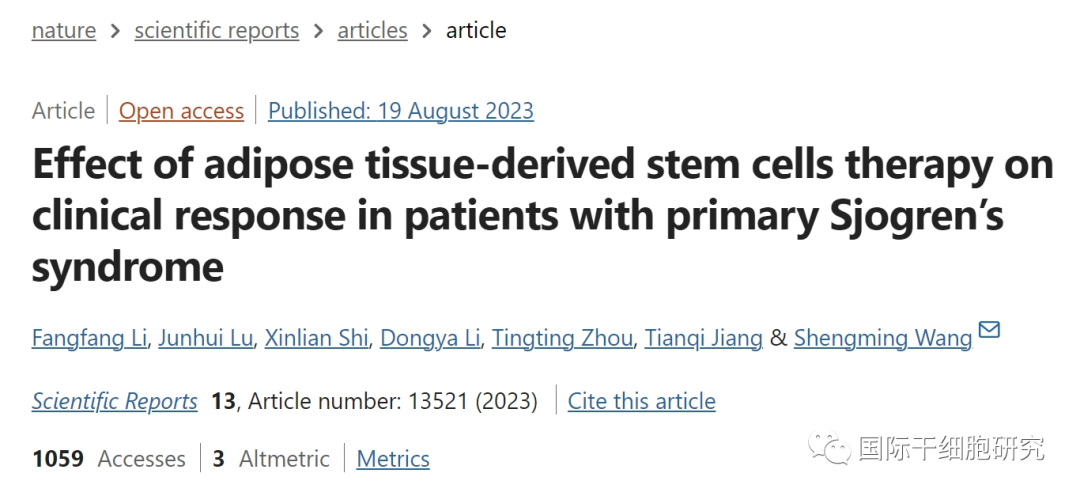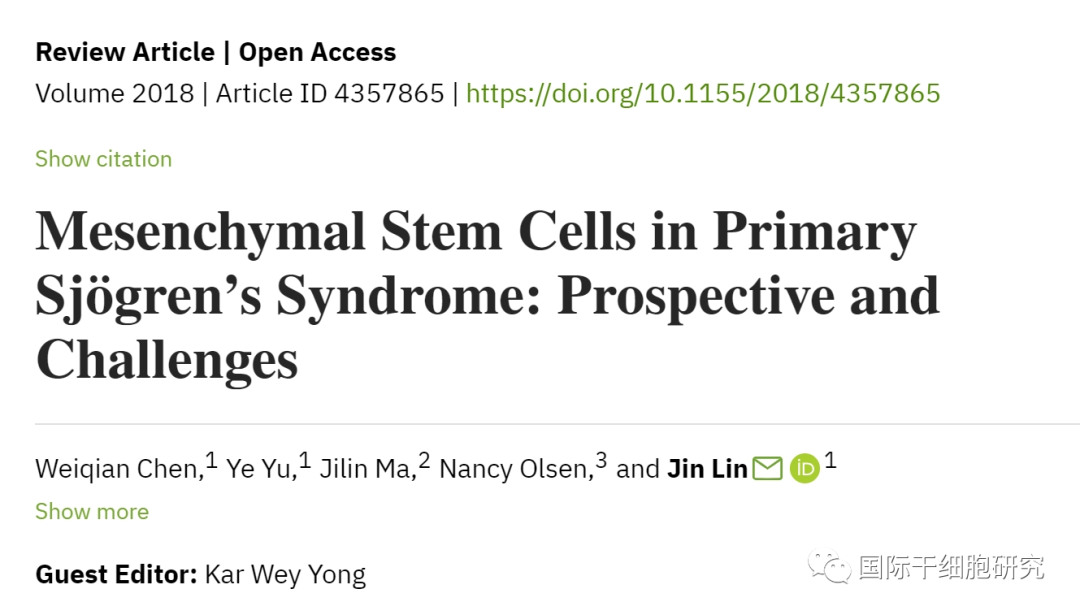
Source: International Stem Cell Research
According to Youtube, Eileen, from Mexico, was diagnosed with "Sjogren's syndrome" two years ago, with obvious hoarseness and other manifestations, and even a state of voice loss, accompanied by acid reflux and other problems, she also produced anxiety, depression and other psychological disorders. In order to avoid having to spend the rest of her life in pain, she sought medical treatment and finally went to the United States to receive stem cell treatment. Fortunately, after treatment, her symptoms were relieved and she regained her health and self-confidence!

Sjogren's syndrome is not just "dry mouth and eyes"

Sjogren syndrome (SS) is a chronic, inflammatory and autoimmune disease characterized by a high degree of lymphocyte infiltration. It is characterized by the destruction of exocrine glands (such as lacrimal glands and parotid glands) due to lymphocyte infiltration, resulting in persistent dry mouth (xerostomia), dry eye (xerophthalmia) and other typical manifestations. It can also involve skin, lung, kidney, blood vessels, nerves and other systemic systems, resulting in caries, periodontal disease, joint pain, vaginal dryness, kidney damage and other systemic complications, seriously affecting the quality of life of patients.
At present, there is no radical treatment for this disease, and the current treatment is mainly to relieve symptoms. For example, through the local use of artificial tears or oral sprays, etc., to alleviate the symptoms of dry eyes and dry mouth; Or take drugs such as cevimelin to relieve dry mouth symptoms. However, none of these drugs can stop the progression of the disease, and long-term use may also produce certain side effects. In recent years, stem cells with anti-inflammatory and powerful immunomodulatory effects have provided a new therapeutic idea for patients with refractory Sjogren's syndrome.
Classification of Sjogren's Syndrome -- "The same disease has different lives"
Sjogren's syndrome is mainly divided into primary and secondary two categories, the treatment emphasis is different.
1. Primary Sjogren's syndrome
The cause is unknown and there are no other autoimmune diseases. Because the cause is unknown, the treatment of such SS is more difficult, and scholars in various countries are also trying to explore how to use stem cells to treat such diseases.
2. Secondary sjogren's syndrome
Secondary to other autoimmune diseases, such as rheumatoid arthritis, systemic lupus erythematosus, polymyositis, systemic sclerosis, etc., such patients should pay attention to the treatment of the primary disease while alleviating symptoms.
Clinical trial of stem cell therapy for Sjogren's syndrome

1. Test 1
According to the authoritative journal "nature" reported that the Huai 'an Hospital affiliated to Xuzhou Medical University carried out a study on "stem cell treatment of Sjogren's syndrome". The study included 64 subjects, including 16 males and 48 females, aged 35 to 74 years. The patients were divided into two groups, the stem cell group and the placebo group.
At the beginning of the trial, the patient's treatment site was given local anesthesia, followed by an ultrasound guided injection of the appropriate solution. In the stem cell group, the prepared adipose stem cell solution was injected into the bilateral parotid glands of the patient; In the placebo group, only 0.9% of saline was injected at the treatment site.
After a period of follow-up, the results showed that the dysfunction of saliva and lacrimal glands in the stem cell group was significantly improved in a short time; The levels of immune and inflammatory markers decreased after treatment.
2. Test 2
The Chinese Journal of Clinicians reported a study in which 24 patients with primary Sjogren's syndrome who had not responded well to glucocorticoid and immunosuppressant therapy were given intravenous transfusions of allogeneic umbilical cord mesenchymal stem cells. The results showed that the condition of these patients improved after stem cell therapy, and the number of plasma anti-SSB and anti-SSA antibodies was greatly reduced.
Why can Stem cells treat Sjogren's Syndrome?

Sjogren's syndrome (SJOgren's Syndrome) is an autoimmune disease, its occurrence is closely related to exocrine glands (such as lacrimal glands, salivary glands) inflammatory infiltration, glandular dysfunction and so on. As the seed "player" of regenerative therapy, mesenchymal stem cells have strong immune regulation ability, anti-inflammatory and anti-angiogenesis effects, etc. Therefore, in recent years, they have been explored for the treatment of SS, the main effects are as follows:
1. Reconstruction of salivary glands
After transplantation, mesenchymal stem cells can differentiate into vascular endothelial cells and salivary gland epithelial cells through cell transformation or fusion, and participate in the repair and reconstruction of salivary glands. It can also produce interleukin-10 (IL-10), improve salivary gland secretion, and help reduce salivary gland lymphocyte infiltration.
2. Participate in the tissue repair of lacrimal glands
After transplantation, mesenchymal stem cells may repair lacrimal tissue through differentiation. The self-proliferating function of stem cells around lacrimal gland can also be used to repair lacrimal gland tissue.
3. Immune regulation
Mesenchymal stem cells (MSC) can regulate both innate and adaptive immune response.
①Regulation of adaptive immunity: In the adaptive immune system, there are some essential cell populations, including B cells, T cells, and regulatory T cells (Tregs). The occurrence of Sjogren's syndrome may be related to exocrine gland infiltration of T lymphocytes, activation of B cells, immunoglobulin and antibody production. Studies have shown that mesenchymal stem cells can regulate the immune function of B cells and T cells.
MSCs inhibit the proliferation of T lymphocytes, and can also produce hepatocyte growth factor (HGF), prostaglandin E2 (PGE2), transforming growth factor β (TGF-B), etc., thus inhibiting Th1 (helper T cell 1), Th17 (helper T cell 17), Tfh (follicular helper T cell) and other cell reactions, and upregulating Tregs. It then acts as an anti-inflammatory.
MSCs can also inhibit the proliferation and differentiation of activated B cells, inhibit the expression of chemokine receptors, and inhibit the production of immunoglobulin, thus playing an anti-inflammatory role.
②Regulation of innate immunity: The innate immune system is the first line of host defense, consisting of natural killer T cells (NK), dendritic cells (DC), mast cells (MC), macrophages and many other immune cells.
Studies have shown that mesenchymal stem cells have a strong immunomodulatory effect on these cells, can inhibit the activation, differentiation and effect of these cells, the production of IL-6 can promote neutrophil apoptosis, inhibit the maturation of DC, and by releasing TSG-6 (tumor necrosis factor α stimulator gene-6), damage its antigen presentation ability, and thus play an anti-inflammatory role.
Small series message
Sjogren's syndrome, especially primary sjogren's syndrome, is difficult to cure completely. Therefore, mesenchymal stem cells with low immunogenicity, strong proliferative ability and unique immunomodulatory function have brought new hope for patients with Sjogren's syndrome. Although most of them are currently in the clinical trial stage, they still have broad application prospects in the treatment of this disease, which is expected to significantly inhibit inflammatory response while preserving the salivary function of patients.